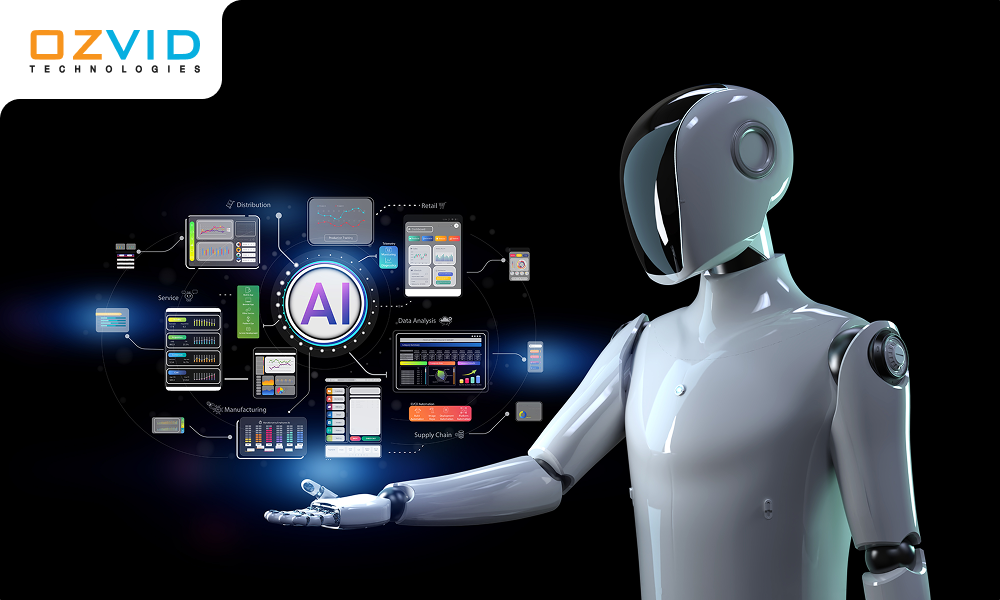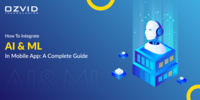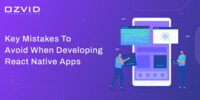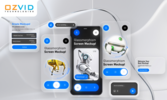- Dec 30, 2025
Share this post on:

In 2025, AI agents are no longer futuristic concepts—they are essential digital allies transforming the way businesses operate. From customer service to financial forecasting and robotic automation, AI agents are enabling companies to scale rapidly and work more efficiently. The surge in intelligent automation has led to widespread deployment of autonomous agents capable of performing tasks with minimal human input.
At OZVID Technologies, a trusted artificial intelligence agency, we have been helping organizations implement intelligent agent solutions tailored to their specific business needs. This guide is designed to provide a complete understanding of AI agents—their functionality, types, benefits, risks, and more—to help you make informed and strategic decisions for your enterprise.
Key Takeaways
- AI agents operate autonomously, making intelligent decisions without human input.
- Different types of AI agents serve various roles, from simple tasks to complex problem-solving.
- Agentic AI bots act proactively, while non-agentic bots are reactive and limited.
- AI agents boost efficiency, reduce costs, and improve user experience across industries.
- Successful implementation requires clear goals, quality data, security, and regular monitoring.
What Are AI Agents?
AI agents are autonomous software entities equipped with artificial intelligence that can sense their environment, process inputs, and take actions to achieve specific goals. These agents are designed to be context-aware, proactive, and capable of learning from experience.
In technical terms, an intelligent agent in AI is any system that perceives its environment via sensors and acts upon that environment via actuators. For example, a chatbot that answers customer queries or a drone that navigates terrain are both AI agents.
Unlike traditional programs that follow fixed instructions, AI agents are dynamic—they analyze real-time data, make decisions, and improve their responses over time. They can be embedded in physical devices (robots, IoT devices) or exist virtually (chatbots, assistants, software services).
How Do AI Agents Work?
AI agents follow a continuous perception-decision-action-learning cycle. Here’s a breakdown of how they function:
Perception: Agents gather data through digital or physical sensors. This includes user queries, sensor inputs, images, audio, or system logs. The data helps the agent understand what’s happening in its environment.
Interpretation: The collected data is processed using AI technologies such as natural language processing, computer vision, or machine learning. This step helps identify context, recognize patterns, and extract insights from raw input.
Decision-Making: Once the data is understood, the agent evaluates multiple actions and chooses the one that best meets its objective. Decision trees, neural networks, or reinforcement learning models are often used for this.
Action: The agent executes the selected action—responding to a user, triggering an alert, adjusting a device setting, or making a recommendation.
Learning: Modern AI agents use feedback from their actions to refine their models. This continuous improvement makes them smarter and more efficient over time.
Agentic vs. Non-Agentic AI Chatbots
The difference between agentic and non-agentic AI chatbots is increasingly relevant in 2025.
Agentic AI Chatbots
These bots can set their own goals and take action proactively. They exhibit traits of autonomy and initiative, making decisions without waiting for user input. For instance, an agentic customer service bot might identify recurring problems in a user's account and initiate troubleshooting, even before the user notices an issue.
Agentic chatbots can manage workflows, update records, initiate conversations, and interact across multiple systems. They behave more like intelligent collaborators than passive tools.
Non-Agentic AI Chatbots
These bots are reactive and operate within predefined rule sets. They require explicit prompts from users and cannot act unless directed. For example, a non-agentic bot might only reply to questions based on preset keywords, without understanding deeper context.
While non-agentic chatbots are simpler and easier to implement, they lack the sophistication needed for complex or evolving environments.
Types of AI Agents
Understanding the types of agent in AI is crucial when choosing or designing intelligent systems for specific use cases. Below are the primary categories:
1. Simple Reflex Agents
These agents operate on condition-action rules. They respond to the current state of the environment without considering history. For example, a sensor that turns on a light when it detects motion.
While efficient for simple tasks, these agents cannot adapt to complex or changing environments.
2. Model-Based Reflex Agents
These agents maintain an internal model of the world to handle partially observable environments. They use historical data to make more informed decisions. For instance, a robot vacuum mapping your house over time for better navigation.
This type is more adaptive and suited for tasks requiring short-term memory.
3. Goal-Based Agents
Goal-based agents select actions by evaluating their outcomes in relation to specific goals. For example, a smart GPS system identifies the shortest route based on traffic conditions to help users reach a destination.
These agents are flexible and can make strategic decisions based on dynamic objectives.
4. Utility-Based Agents
In addition to achieving goals, utility-based agents aim to maximize performance by choosing the most “valuable” outcomes. A financial trading bot, for example, evaluates various options to choose the one with the highest profit potential.
These are ideal for environments where trade-offs exist and not all goals are equally desirable.
5. Learning Agents
Learning agents improve performance over time by learning from outcomes and adapting behavior. They consist of a performance element (executing tasks) and a learning element (refining decision rules).
They are ideal for environments where data patterns evolve and continuous improvement is needed.
6. Multi-Agent Systems
These consist of multiple interacting agents that can collaborate or compete. Each agent has its own capabilities, but together they accomplish complex tasks—such as managing air traffic or coordinating autonomous delivery drones.
Multi-agent systems are often used in logistics, gaming, and decentralized platforms.
Use Cases of AI Agents
AI agents are being widely adopted across industries in 2025. Their ability to analyze data, make decisions, and act autonomously makes them invaluable for automating tasks, improving efficiency, and delivering intelligent services. Let’s explore the most impactful and practical applications:
1. Customer Support Automation
AI agents in customer service are revolutionizing how businesses interact with customers. These agents handle FAQs, complaints, order tracking, and even technical troubleshooting across chat, voice, and email channels. They analyze user sentiment, provide personalized responses, and learn from interactions to improve over time. By reducing response time and human involvement, businesses significantly cut costs while enhancing user satisfaction and service availability 24/7.
2. Healthcare Monitoring and Diagnostics
AI agents in healthcare assist in patient monitoring, early diagnosis, and treatment planning. Wearable devices powered by intelligent agents track vital signs in real-time, alerting healthcare providers to anomalies like irregular heartbeat or oxygen levels. Diagnostic agents analyze imaging data and medical histories to detect diseases such as cancer or diabetes with high accuracy. This accelerates clinical decisions and reduces the workload on medical professionals.
3. Financial Analysis and Fraud Detection
AI agents in finance monitor transactions, predict stock trends, and detect fraudulent activities. Trading bots use real-time market data to buy or sell assets at optimal times, maximizing investment returns. Fraud detection agents scan millions of transactions for unusual patterns, flagging suspicious activities instantly. They also offer personalized financial advice to users based on spending behavior, credit history, and market conditions—ensuring smarter financial decisions.
4. E-commerce Personalization and Sales Optimization
E-commerce platforms leverage AI agents for personalized product recommendations, dynamic pricing, and automated customer interactions. Agents analyze user behavior, purchase history, and browsing patterns to suggest products with high conversion potential. They also optimize inventory levels and predict demand trends, helping retailers manage supply chains efficiently. Intelligent chatbots further enhance user experience by guiding users through the purchase process and resolving queries instantly.
5. Manufacturing and Predictive Maintenance
In manufacturing, AI agents monitor equipment performance, detect failures before they occur, and schedule maintenance tasks autonomously. These predictive maintenance agents reduce downtime and extend machinery life. They also assist in production line optimization, quality control, and resource allocation. By analyzing data from IoT sensors and production systems, these agents ensure real-time operational efficiency, saving manufacturers millions in lost productivity and repairs.
6. Education and Adaptive Learning
AI agents in education provide customized learning experiences by adapting content based on student progress, behavior, and preferences. These agents analyze quiz results, study patterns, and engagement metrics to tailor lesson plans for each learner. They also offer real-time feedback, assist with assignments, and track performance over time. Educational institutions use them to identify at-risk students early, enabling timely intervention and improved academic outcomes.
7. Transportation and Logistics Optimization
In transportation, AI agents are embedded in autonomous vehicles to make real-time decisions on navigation, speed, and obstacle avoidance. Logistics companies use agents to optimize delivery routes, predict traffic patterns, and manage fleets efficiently. These agents also monitor vehicle health and fuel usage, ensuring reduced costs and faster deliveries. Multi-agent systems collaborate across different transport layers to improve coordination and on-time performance.
8. Human Resources and Recruitment
AI agents streamline recruitment by scanning resumes, ranking candidates, and even conducting initial screening interviews. These agents analyze job descriptions and match them with candidate profiles using natural language processing. They also identify top performers based on behavioral patterns and past achievements. HR departments use them to automate onboarding, answer employee FAQs, and monitor workplace engagement, saving time and enhancing decision accuracy.
9. Smart Home Automation
In smart homes, AI agents manage lighting, climate control, security, and entertainment systems. They learn user preferences and habits to automate routines—such as adjusting lights and thermostats or suggesting content to watch. Security agents monitor entrances, detect intrusions, and alert homeowners instantly. With voice and mobile controls, these AI agents in smart homes enhance comfort, energy efficiency, and safety in modern living environments.
10. Agriculture and Precision Farming
Agricultural AI agents monitor crop health, soil conditions, and weather patterns to provide actionable insights to farmers. Drones equipped with intelligent agents can identify pest infestations or nutrient deficiencies and suggest targeted treatments. Irrigation systems controlled by agents optimize water usage based on plant needs and climate data. This results in higher yields, reduced waste, and more sustainable farming practices.
Benefits of AI Agents
1. Increased Operational Efficiency
AI agents streamline and automate repetitive and time-consuming processes, enabling businesses to operate at peak efficiency around the clock. They handle large volumes of data, communications, and transactions without delays or errors, ensuring continuous operations. This allows human employees to focus on higher-level strategic tasks, ultimately boosting overall productivity and workflow performance.
2. Significant Cost Reduction
By replacing or supplementing human labor in routine or complex tasks, AI agents significantly reduce operational costs. From automating customer service interactions to managing backend processes like data entry or order fulfillment, AI agents help companies save on staffing, training, and infrastructure, making them a highly cost-effective solution for both startups and large enterprises.
3. Enhanced Customer Experience
AI agents can interact with users in real-time, offering instant, accurate, and context-aware responses. Their ability to remember past interactions and preferences helps personalize the experience, leading to increased satisfaction and brand loyalty. Unlike human agents, they are available 24/7, ensuring support and engagement even during non-business hours across time zones.
4. Scalability Across Business Operations
AI agents can scale effortlessly to handle growing volumes of users, data, and requests without compromising speed or quality. Whether your business is expanding across regions or launching new product lines, AI agents provide the infrastructure to manage exponential workloads—making them ideal for companies aiming for sustainable, long-term growth.
5. Real-Time Decision Making
AI agents can analyze real-time data from multiple sources, detect patterns, and respond immediately. In sectors like healthcare, finance, and logistics, this real-time responsiveness helps prevent errors, predict outcomes, and optimize processes. Whether it’s detecting fraud or suggesting treatment options, AI agents help organizations make smart decisions without delay.
6. Continuous Learning and Adaptability
Modern AI agents improve over time through machine learning and reinforcement learning techniques. They adapt to changing environments, user behavior, and emerging trends, making them smarter with each interaction. This self-improvement allows businesses to maintain relevance, accuracy, and efficiency without constant human reprogramming or intervention.
7. Improved Accuracy and Reduced Errors
AI agents eliminate the risk of human error in tasks like data processing, calculations, or record-keeping. By following strict logic and rules, they ensure consistent accuracy across operations. This reduces the chances of mistakes that can lead to financial losses, customer dissatisfaction, or compliance issues—especially in sensitive domains like healthcare and finance.
8. Better Data Utilization
AI agents excel at gathering, organizing, and interpreting vast volumes of structured and unstructured data. They transform raw information into actionable insights, helping businesses make data-driven decisions. This ability to harness big data provides a competitive edge and enables better forecasting, planning, and resource allocation across departments.
9. Cross-Channel Integration and Automation
AI agents can seamlessly integrate with existing business systems, APIs, and digital platforms, allowing cross-functional automation. For instance, they can coordinate between CRM tools, email services, inventory databases, and payment gateways, creating smooth workflows and eliminating manual bottlenecks in communication, sales, or customer management processes.
10. Competitive Advantage in Digital Transformation
Adopting AI agents positions a business as a forward-thinking and tech-savvy organization. Companies that leverage intelligent agents can outperform competitors by delivering faster service, more accurate results, and personalized experiences. This level of innovation not only enhances customer trust but also strengthens the company’s brand reputation in a digitally evolving market.
AI Agents vs. AI Assistants
While often used interchangeably, there’s a difference between AI agents and AI assistants:
AI Agents
AI agents are autonomous, intelligent systems that can perceive their environment, make decisions, and act on their own to achieve specific goals. They operate proactively, meaning they don’t require user input to initiate action. Instead, they evaluate situations in real-time, adapt to changes, and learn from feedback to improve performance over time. These agents are capable of handling complex tasks like managing workflows, analyzing large data sets, and coordinating with other systems or agents. Because of their autonomy and intelligence, AI agents are ideal for enterprise solutions where continuous monitoring, intelligent decision-making, and adaptability are critical for operational success.
AI Assistants
AI assistants, such as Siri, Alexa, or Google Assistant, are designed to assist users with specific tasks based on direct input. They are reactive in nature, meaning they wait for user commands to perform functions like setting reminders, answering questions, or playing music. Unlike AI agents, they don’t possess the autonomy to act independently or learn complex decision-making processes. While AI assistants offer convenience and improve user experience in personal and professional settings, their capabilities are limited to predefined functions. They are best suited for simple, routine interactions rather than dynamic problem-solving or enterprise-level task automation.
Best Practices for Using AI Agents
To ensure effective deployment of AI agents, follow these best practices:
1. Define Clear Objectives: Start with a specific goal. Whether it's improving customer service or automating logistics, knowing your target outcome helps in designing the right agent.
2. Use Quality Data: Training agents on accurate, diverse, and unbiased data ensures reliability. Poor data quality leads to poor performance and flawed decisions.
3. Monitor and Audit: Continually evaluate your agent’s performance. Track key metrics, watch for errors, and refine the algorithms based on feedback.
4. Implement Security Measures: Use encryption, access controls, and threat detection systems to protect AI agents from cyber threats.
5. Ensure Human Oversight: Keep humans in the loop, especially in critical tasks. AI agents should support, not replace, human judgment in sensitive areas.
Conclusion
AI agents are transforming the digital world in 2025. With capabilities that span across industries, these intelligent systems bring efficiency, personalization, and scalability like never before. However, deploying AI agents requires strategic planning, ethical considerations, and continuous improvement.
At OZVID Technologies, we specialize in developing cutting-edge AI solutions, including customized AI agents that align with your business objectives. As a forward-thinking artificial intelligence agency, we empower organizations to lead the AI revolution with confidence, security, and innovation.
Ready to take your business to the next level with AI agents? Partner with OZVID Technologies today.
FAQ's
1. What distinguishes an AI agent from traditional automation tools?
AI agents go beyond traditional automation by possessing autonomy, intelligence, and adaptability. While automation tools follow predefined rules and workflows, AI agents perceive their environment, make decisions in real-time, and learn from feedback. This makes them ideal for dynamic tasks that require contextual awareness and proactive responses without human supervision.
2. Can AI agents collaborate in multi-agent systems?
Yes, AI agents often function within multi-agent systems where they interact, share knowledge, and collaborate toward common or individual goals. These systems are used in complex environments like robotics, smart cities, and logistics. Agents in such systems may communicate through protocols and coordinate decisions, improving efficiency, scalability, and problem-solving capabilities.
3. Are AI agents capable of maintaining long-term memory?
Modern AI agents can store and retrieve past interactions using long-term memory structures like knowledge graphs, memory-augmented networks, or persistent storage. This enables them to learn from historical data, maintain context across sessions, and provide more personalized and accurate responses, especially in customer service, education, and recommendation systems.
4. What role does natural language processing (NLP) play in AI agents?
NLP allows AI agents to understand, process, and generate human language. It plays a vital role in enabling agents to interpret text or speech inputs, extract intent, and respond naturally. In applications like chatbots or voice assistants, NLP powers conversational abilities, making the agent more interactive, intuitive, and user-friendly.










